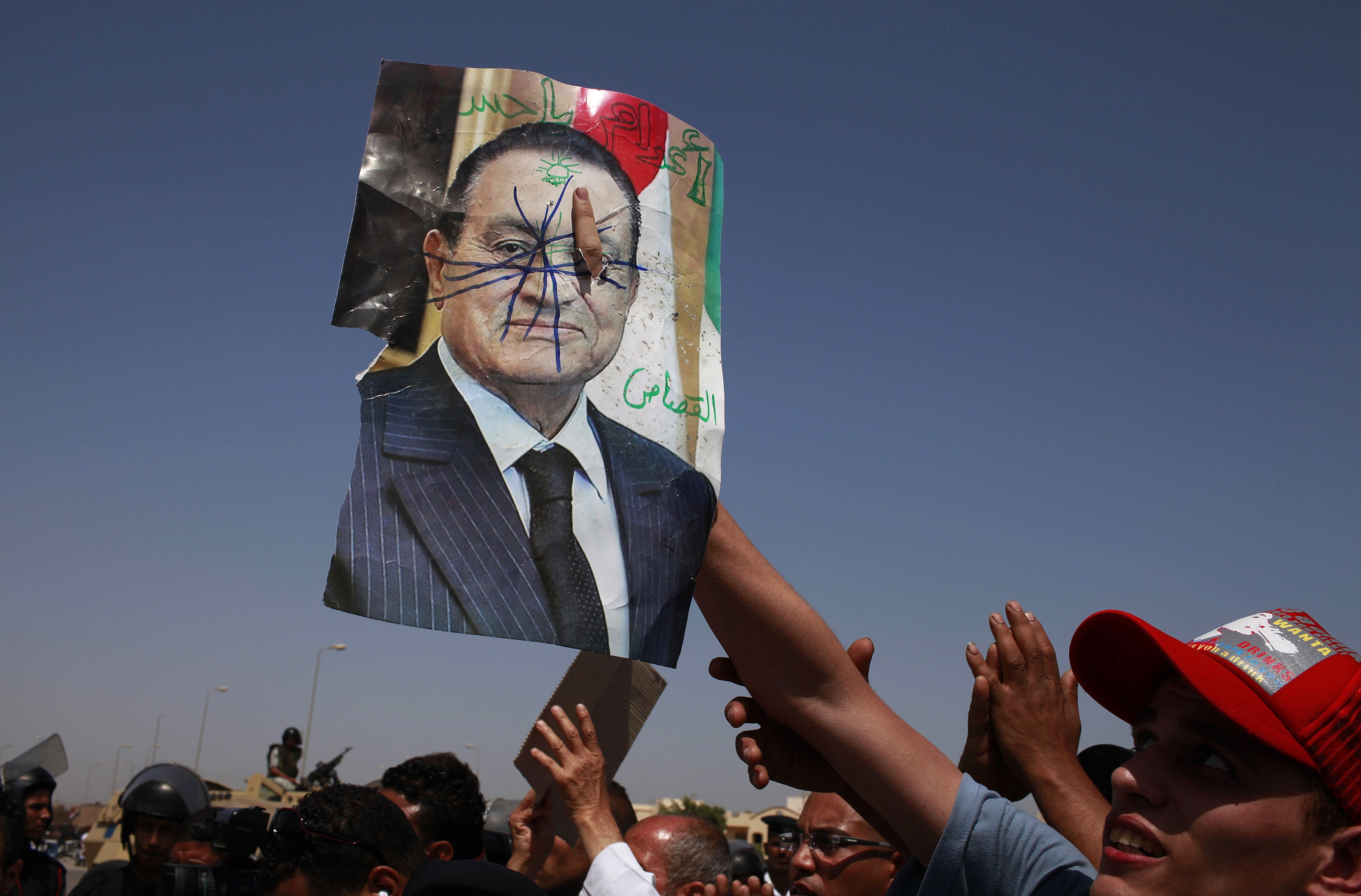Latest NEWS
- Aswat Masriya, the last word
- Roundup of Egypt's press headlines on March 15, 2017
- Roundup of Egypt's press headlines on March 14, 2017
- Former Egyptian President Hosni Mubarak to be released: lawyer
- Roundup of Egypt's press headlines on March 13, 2017
- Egypt's capital set to grow by half a million in 2017
- Egypt's wheat reserves to double with start of harvest -supply min
- Roundup of Egypt's press headlines on March 12, 2017
UPDATE - Court drops case against Mubarak over complicity in killing protesters

A man who is anti-Mubarak holds a defaced picture of the former Egyptian president outside the police academy where Mubarak is on trial in Cairo June 2, 2012. Mubarak, who governed Egypt for 30 years before a popular uprising toppled him last year, will hear a judge rule on Saturday on whether he is guilty of graft and complicity in the killing of protesters - REUTERS/Suhaib Salem
CAIRO, November 29 (Aswat Masriya) – The Cairo Criminal Court dropped on Saturday the case against Egypt's former President Hosni Mubarak over complicity in the killing of protesters during the 18-day January 2011 uprising which toppled his regime.
The court also acquitted Mubarak's Interior Minister Habib al-Adly and four of his aides on charges of inciting and aiding the killing of 238 protesters. The acquitted aides are; Ahmed Ramzy, Adly Fayed, Hassan Abdel Rahman and Ismail al-Shaer.
The five defendants, alongside other aides Osama al-Marasi and Omar Afifi, were also acquitted of the charge of harming their work-place.
The sentences were met with applause in the courtroom.
The trial was held at the Police Academy amid heavy security presence.
The court also acquitted Mubarak and Egyptian businessman Hussein Salem of the graft charges related to the exportation of gas to Israel. Salem is being tried in absentia.
Mubarak and his two sons Alaa and Gamal were accused of exploiting their influence in Salem's favour after the latter granted them five villas in the Sinai resort city of Sharm el-Sheikh. The judge heading the trial, Mahmoud al-Rashidi said that the statute of limitations in this case has expired, and therefore the court lacks jurisdiction to rule on it.
The verdict can still be challenged at the Court of Cassations.
The judge said that during the retrial, the court was able to count the death toll for the clashes which erupted during the uprising and until January 31, 2011. The day marks the last day of Adly's reign in the ministry of interior; he was removed from the ministry the next day.
According to the judge, 238 protesters were killed in 10 governorates nationwide during this period of time, as well as 1588 injured. Rashidi added that there were 36 protesters injured during this time who died later due to their wounds.
Rashidi reminded that those who would later comment on the verdict have not read the reasons of the verdict. He said that the draft of the verdict was made up of 1430 pages.
The judge had postponed the verdict on September 27, citing the need for extra time to prepare the reasons for judgment.
When testifying on his own behalf, the former president denied he ordered the killing of protesters who participated in the January 25, 2011 uprising.
"Mubarak, who stands in front of you, would never order the killing of protesters ... or any Egyptian under any conditions," Mubarak said on August 13. The former president also denied he was behind the security vacuum which started on January 28 in 2011 following an unprecedented wave of protests. Mubarak dismissed as well financial corruption charges leveled against him.
Mubarak's sons, Alaa and Gamal waived their right to testify on their own behalf in court, according to their lawyer Farid al-Deeb. The remaining seven defendants tried in session all denied the accusations they are facing.
Mubarak and his interior minister were sentenced to life in prison in 2012 for the same charges before an appeals court ordered their retrial. The retrial began in April, 2013.
In May, a Cairo court sentenced Mubarak to three years in prison on embezzlement charges, while his two sons were sentenced to four years in prison for the same charges.
He is serving time in a military hospital in Cairo.










